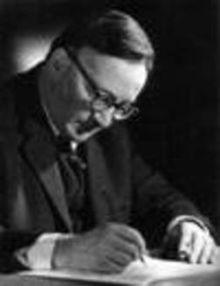- Franz Reizenstein
-
Franz Theodor Reizenstein (7 June 1911 – 15 October 1968) was a German-born British composer and concert pianist. He left Germany for sanctuary in Britain in 1934 and went on to have his career there, including teaching at the Royal Northern College of Music and Boston University, as well as performing.
Contents
Life and work
Franz Reizenstein's parents were Dr. Albert Reizenstein (1871-1925) and Lina Kohn (b. 1880), both of Nuremberg, Germany. The family was Jewish and counted many professionals and musically inclined people among its members.
Reizenstein grew up in Nuremberg and was considered a child prodigy. He composed his first pieces when he was 5, and by the age of 17 he had written a string quartet. His well-to-do and artistic family encouraged him to play chamber music at home. Eventually he was sent to study under Paul Hindemith at the Berliner Hochschule für Musik.
In 1934 he emigrated to England at the age of 23 to escape the Nazis, one of nearly 70 Jewish composers to do so from 1933-1945.[1] Once in England, he furthered his studies under Ralph Vaughan Williams at the Royal College of Music, and began to incorporate English music into his works. He eventually became a professor at the Royal Academy of Music and the Royal Northern College of Music (then the Royal Manchester College of Music) in Manchester. Although he never taught composition in Great Britain, he was invited for six months as a Visiting Professor of Composition at Boston University in the United States, where there were also special concerts given of his works.[2]
Reizenstein published his first piece, the Suite for Piano, Op. 6, in 1936. He gained more attention with the "virtuosic and flamboyant" Prologue, Variations and Finale, Op. 12, composed for the violinist Max Rostal.[3] It was inspired by an extended tour which he took to South America (undertaken with another legendary violinist, Roman Totenberg). Reizenstein performed as a pianist as well as working as a composer.[4]
He composed several chamber and piano works, which are highly regarded, as well as a number of orchestral works, overtures and concertos (a Concerto for String Orchestra, two Piano Concertos, a Violin Concerto and a Cello Concerto). Reizenstein is best remembered for his Piano Quintet in D major, Op. 23 (1959), of which the critic Lionel Salter wrote in Gramophone in 1975: It "stands alongside Shostakovitch's as the most noteworthy of this century's piano quintets."[5]
He also wrote two operas: Men Against the Sea (1949) and Anna Kraus (1952). He composed a lavish orchestral score for Hammer Studios' horror film The Mummy (1959).
Hoffnung Festivals
Reizenstein contributed the Concerto Popolare ("A Piano concerto to end all piano concertos") to Gerard Hoffnung's first music festival in 1956. Hoffnung's festivals were comedy events, trading on the musical knowledge of the audience. The premise of the Concerto Popolare is that the orchestra believes it is playing Tchaikovsky's First Piano Concerto, but the pianist believes he or she is playing the Grieg Piano Concerto. A pitched musical battle ensues, dragging in other themes (notably from Rhapsody in Blue, the Warsaw Concerto and the music-hall song "Roll Out the Barrel"). The soloist at the premiere was Yvonne Arnaud (otherwise a renowned actress), who had been chosen after Hoffnung's first choice, Eileen Joyce, declined.
Also popular was his set of Variations on The Lambeth Walk (a popular song of the 1930s), for solo piano, each variation being a parody of the style of a major classical composer. The composers parodied are Chopin, Verdi, Beethoven, Mozart, Schubert, Wagner and Liszt.
Marriage and family
He married in England, and he and his wife had a son.
Through his mother's Kohn family, Reizenstein was related to the writer Catherine Yronwode.
References
- ^ Michael Haas, "The Emigré Composers", Jewish Music Institute, University of London, 2004, accessed 12 Jun 2010
- ^ Simon Wynberg, "Franz Reizenstein biography", Links to bibliography, discography and media; The OREL Foundation, accessed 12 Jun 2010
- ^ Simon Wynberg, "Franz Reizenstein biography", Links to bibliography, discography and media; The OREL Foundation, accessed 12 Jun 2010
- ^ Simon Wynberg, "Franz Reizenstein biography", Links to bibliography, discography and media; The OREL Foundation, accessed 12 Jun 2010
- ^ Michael Haas, "The Emigré Composers", Jewish Music Institute, University of London, 2004, accessed 12 Jun 2010
External links
Categories:- 20th-century classical composers
- British composers
- Opera composers
- British film score composers
- Jewish composers and songwriters
- Jewish classical pianists
- Child classical musicians
- Jews who emigrated to the United Kingdom to escape Nazism
- Alumni of the Royal College of Music
- People from Nuremberg
- 1911 births
- 1968 deaths
Wikimedia Foundation. 2010.

